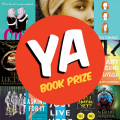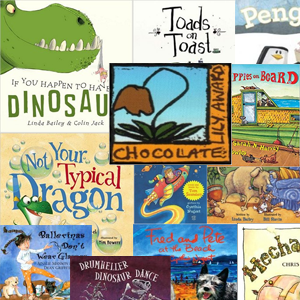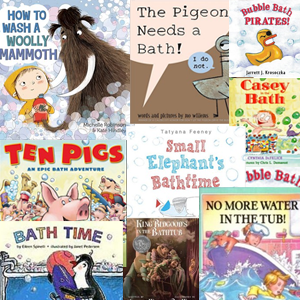
Q: Starting From Scratch isn’t a cookbook, but it is a book for children about food. What need do you see this book fulfilling? What does Starting From Scratch offer children, families, and educators that no other kids book does?
A: This book empowers kids with the knowledge they need in order to cook a meal. In the past, people learned to cook by watching their parents (usually mothers and grandmothers) in the kitchen. But as a society, we are cooking from scratch less frequently, and lots of skills and knowledge have been lost. This book steps in to fill this gap and brings kids back into the kitchen where they can have fun making yummy food.
Q: Starting From Scratch addresses a wide variety of information pertaining to food, including biological, chemical, sociocultural, environmental, and economical concepts. So why begin the book, of all places, with a chapter on taste?
A: Good question! Our first relationship with food is about taste-the flavors, the textures, the smells. Kids experience first and foremost the taste of what they eat-unlike adults, they don’t usually think about where it comes from or how it is presented. But we don’t talk a lot about taste in North America, not like in France where schools spend one week every autumn just teaching kids to taste their food so they can enjoy it more! So this particular section of the book is to awaken kids to what’s happening in their mouths and their noses and their brains when they eat. I’ve found that younger people respond very well to the suggestion that they should slow down and take the time to think about all the different ways they taste their food.
Q: You pose the question to your child reader: “Why should you cook?” How might you answer your own question?
A: If you can cook, you can be independent and take care of yourself. You get to choose what you eat–and how much salt, fats, and sugar foods contain. You can also save money by buying ingredients and cooking from scratch rather than buying pre-made foods or always eating in restaurants. Plus it’s fun to cook! I try to show kids how what they choose to cook can be a playful way of telling the world a little about who they are.
Q: Who (or what) were your greatest influences in the kitchen growing up? Did you always have an enthusiasm for food culture and cuisine?
A: I spent a lot of time playing at my grandmother’s feet as she cooked, and so I learned about food by studying her. By watching her enjoy her meals-because, boy, did she love to eat-I learned that food was something to celebrate and relish in every day, and that you don’t need a special occasion to make a delicious meal.
Q: As a mother of two young children, what recipes might you suggest for children just learning how to cook, but who are not yet ready for knives, stove-tops, or ovens?
A: When my kids were very young-I think as young as two-and-a-half-I gave them butter knives and showed them how to cut mushrooms. My six year-old can now make salad dressing with confidence (although I do hover so the oil doesn’t gush out of the bottle as she pours). I don’t remember when my 8 year-old started baking muffins, but I still get nervous about her burning herself on the oven. While we obsess about safety in North America, when I was on a research trip in France, I found that people there believed you just needed to teach kids how to be safe. I was at a chef’s school where they offered kids’ classes, and saw a long line of sharp knives hanging on the wall. I commented to the man who ran the program about the risk of putting sharp instruments into small hands. He looked at me perplexed. “Well, we wait until they are old enough!” he said. “They have to be at least six years-old!”
Q: What did you love to cook when you were a child?
A: I was desperate to get into the kitchen as a child. My mother let me make cakes in the toaster oven with a little flour and some chocolate milk powder (the DIY version of an Easy Bake Oven cake!) but I really wanted to cook real food and use real eggs and other ingredients. By the time I was 10, I remember making cookies and preparing crepes for my sister before our parents woke up on a weekend morning. For me, cooking was about independence and feeling like a grown-up. This feeling of empowerment is what I hope to transmit to kids with the book.
Q: Starting From Scratch, with its vibrant illustrations and lively, conversational tone, is quite a playful book. How might families and educators encourage play in the kitchen and in the classroom when learning about food?
A: I think there are great opportunities to play in the kitchen, especially with taste. Adults and kids alike can have fun doing taste tests with just about anything-from candies to yoghurt (does strawberry yoghurt or candy taste like a real strawberry?) to carrots (what does a carrot taste like anyway? I taste grassy flavors in a fresh carrot).
Q: Tell us about the four basic recipes you chose for “Appendix A.” How do pasta sauce, lentil soup, granola, and oatmeal cookies bring together the lessons and ideas you weave throughout Starting From Scratch?
A: I wanted to offer kids four recipes that would free them from using common supermarket staples: pre-made pasta sauce (full of sugar and salt), canned soup (typically has insane sodium levels), boxed cereal (sugar often appears multiple times on an ingredient list) and packaged cookies (once you get used to homemade chocolate cookies, those hard, dry cookies in a box don’t taste good anymore). So these recipes show kids that they can make food from scratch that is more delicious than what you can buy at the supermarket. This knowledge is exciting, empowering and appetizing!
Q: While this book has a clear place in the classroom for children ages ten and up, there will be parents of graduating high school seniors who will want to gift this book to their son or daughter before they head off to university. How might a college freshman-newly equipped with her independence and the hot-plate in her dormitory kitchen-use Starting From Scratch to learn how to cook and eat for themselves?
A: When I was writing the book, I used plain language so that a younger child could understand. But I did keep this older reader in mind because a lot of people grow up without having the opportunity to learn to cook, and I thought they might use the book too. An older reader will be able to take the information in the book and start to apply it to a more creative approach to cooking. Hopefully, by learning all about food, they will be able to improvise in the kitchen, bolstered by a deeper understand of what they are doing.
Q: One of the most refreshing aspects of Starting From Scratch is that the book doesn’t talk down to children, it doesn’t ascribe to gendered ideas of “who” likes to spend time in the kitchen, nor does it take a limited view of “kid-friendly” food (the stereotypical mac & cheese, PB&J, etc). Are you hoping to inspire a new generation of foodies, or of Top Chef contestants? What readers did you have in mind when writing the book?
A: I might be a food journalist, but I don’t consider myself to be a foodie. I love delicious meals but I’ve found that in day-today life, what is tasty and practical is often simple home cooking. The meals I make at home are quick and easy but flavorful and nutritious. This is the kind of practical yet yummy cooking that I want to help people to achieve. If you can make a really good dinner in less time than it takes for a delivery order to arrive or for a few microwave dinners to heat-and I do this most nights and so can a 12 year-old with a little practice-
then chances are you’ll be cooking from scratch, saving money, and eating healthier food.
SARAH ELTON is an author and journalist who specializes in food writing. Her books for adults include Consumed: Sustainable Food for a Finite Planet and Locavore: From Farmer’s Fields to Rooftop Gardens, How Canadians are Changing the Way We Eat. She is a frequent contributor to CBC Radio. This is her first book for children. She lives in Toronto, Canada. Visit sarahelton.ca & find Sarah on Twitter @SarahAElton.
JEFF KULAK is an award-winning illustrator and designer with numerous books to his credit including the Learn to Speak series, for which he won an Alcuin Book Design Award. He lives in Montreal, Quebec.
Content Courtesy of Owlkids Books and 45th Parallel Communications. Used with permission.



